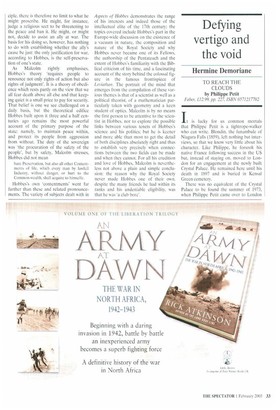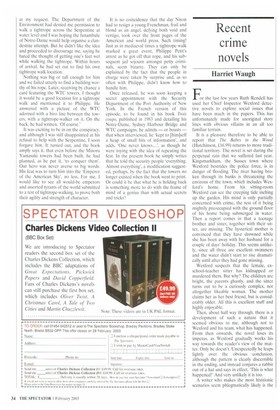Defying vertigo and the void
Hermine Demoriane
TO REACH THE CLOUDS by Philippe Petit Faber. £12.99, pp. 227, ISBN 0571217702 It is lucky for us common mortals that Philippe Petit is a tightrope-walker who can write. Blondin, the funambule of Niagara Falls (1859), left nothing but interviews, so that we know very little about his character. Like Philippe, he forsook his native France following success in the US but, instead of staying on, moved to London for an engagement at the newly built Crystal Palace. He remained here until his death in 1897 and is buried in Kensal Green cemetery.
There was no equivalent of the Crystal Palace to be found the summer of 1973, when Philippe Petit came over to London at my request. The Department of the Environment had denied me permission to walk a tightrope across the Serpentine at water level and 1 was hoping the funambule of Notre-Dame would help organise a clandestine attempt. But he didn't like the idea and proceeded to discourage me, saying he hated the thought of getting one's feet wet while walking the tightrope. Within hours of arrival, he had set out to find his own tightrope walk location.
Nothing was big or tall enough for him and we failed utterly to find a building worthy of his rope. Later, receiving by chance a card featuring the WTC towers. I thought it would be a good location for a tightrope walk and mentioned it to Philippe. He answered with a picture of the WTC adorned with a biro line between the towers, with a tightrope-walker on it. On the back, he had written, 'Of course.'
It was exciting to be in on the conspiracy, and although I was still disappointed at his refusal to help with the Serpentine, I soon forgave him. It turned out, and the book amply says it, that even before the Minoru Yamasaki towers had been built, he had planned, as he put it, to conquer them'. Our hero was never averse to big words. His feat was to turn him into the 'Emperor of the American Sky', no less. For me. I would like to see all would-be emperors and assorted tyrants of the world submitted to a test of tightrope-walking, to prove both their agility and strength of character. It is no coincidence that the day Nixon had to resign a young Frenchman, frail and blond as an angel, defying both void and vertigo, took over the front pages of the American and world press. Such timing! Just as in mediaeval times a tightrope walk marked a great event, Philippe Petit's arrest as he got off that rope, and his subsequent jail sojourn amongst petty criminals, seem bizarre. They can only be explained by the fact that the people in charge were taken by surprise and, as so often with Philippe, didn't know how to handle him.
Once released, he was soon keeping a secret appointment with the Security Department of the Port Authority of New York. In the French version of this episode, to be found in his book Trois coups, published in 1983 and detailing his Notre-Dame, Sydney Harbour Bridge and WTC campaigns, he admits — or boasts — that when interviewed, he 'kept to [him]self a heap of small bits of information', and adds, 'One never knows...', as though he were toying with the idea of repeating the feat. In the present book he simply writes that he told the security people 'everything. Almost everything', a modification suggested, perhaps, by the fact that the towers no longer existed when the book went to print. Or could it be that what he is holding back is something more to do with the frame of mind of a genius than with actual secrets and tricks?



























































 Previous page
Previous page